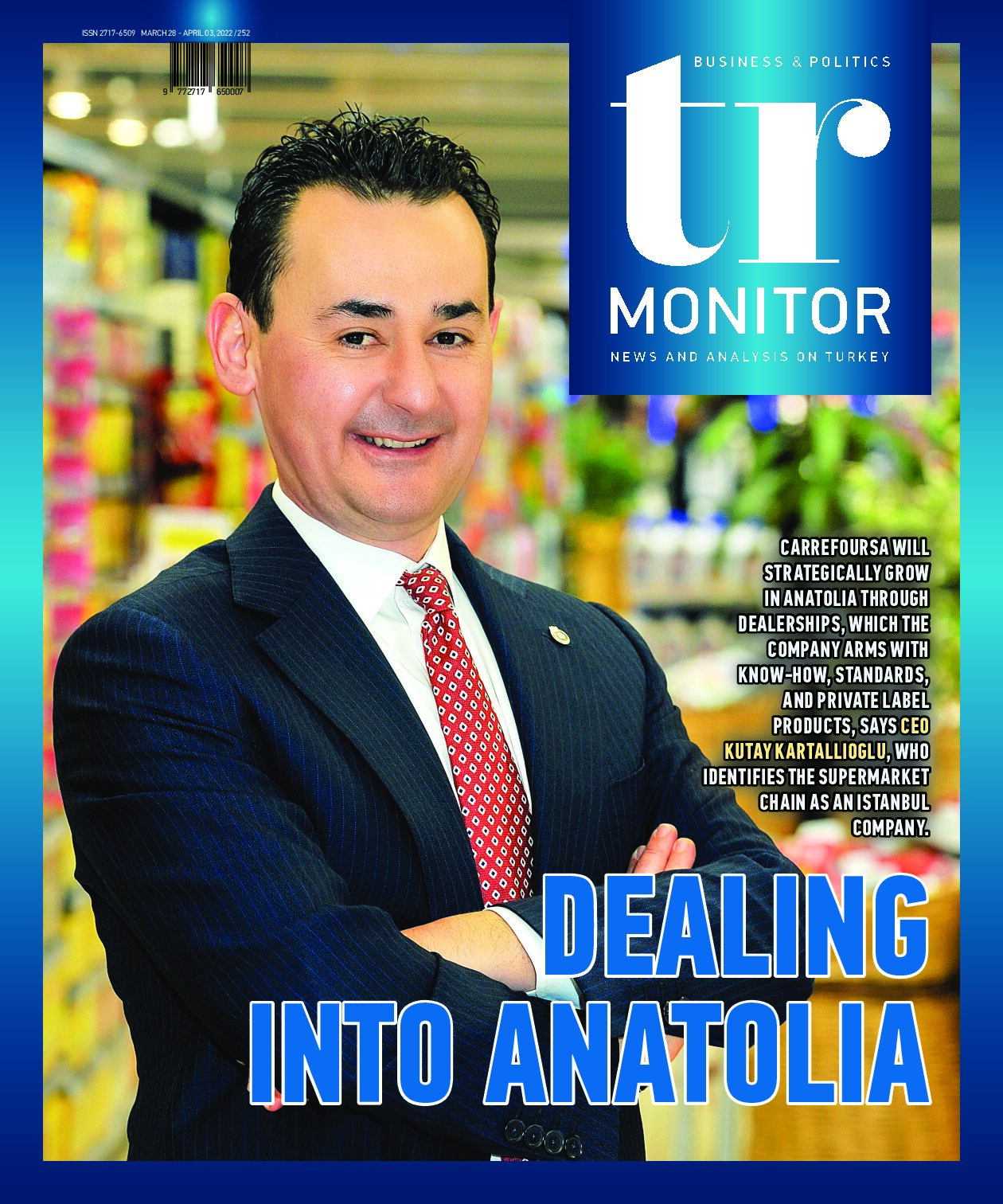By HANDAN SEMA CEYLAN
CarrefourSa, which generates 6% of its turnover from e-commerce and generates 15% of sales from its own label’s products, has built its new growth strategy on tradesmen. Today, 76 of CarrefourSA’s 758 stores are dealerships, 13 of which are owned by female entrepreneurs. “CarrefourSA has been operating in Turkey with an advanced business perspective built on the relationship between dealers and our brand for 31 years,” said Kutay Kartallioglu, CarrefourSA CEO.
“We care about our tradesmen”, said Kartallioglu, noting that they put a great effort into raising the awareness of their 76 individual dealers. “We are actually trying to arm our tradesmen, so to speak. Instead of opening thousands of CarrefourSA stores all over Anatolia, we encourage tradesmen to open up their own stores under the Carrefour brand and use our private label products and know-how. We train them, for example, in our fish and butcher department standards,” he said, defining the practice as a win-win business model. The supermarket chain is expanding this practice into a company-wide growth strategy.
The strategy has resulted in a 508,000 square-meter net sales area in 40 provinces, as of 2021. “This physical growth has had an important contribution to our turnover, which reached TRY 9.4bn. billion TL last year. Thus, our turnover per square meter increased by 19.3% compared to 2020, reaching TRY 18,400,” Kartallioglu noted.
CarrefourSa has 4,000 suppliers, ranging from giant multinationals to local producers that can only serve 10 to 15 CarrefourSA stores. The supermarket chain applies similar commercial and shelf conditions for all of them. “We are a pretty good buyer for SMEs,” says Kartallioglu noting that their maturities are quite reasonable and they adopt supplier financing programs with banks.
40% target for e-commerce
On the other hand, physical retail and e-retail are intertwining more and more, which will give 360-degree coverage to the consumer, according to Kartallioglu. Amazon, the pioneer of e-commerce, bought retail chain Whole Foods for USD 15bn and Chinese Alibaba announced that it will open 2,000 supermarkets by 2023, he cited. E-commerce has also reached 6% of CarrefourSa’s turnover in 2021 and the target is to reach 10% this year and 40% in the medium-term.
CarrefourSA currently has 6.5 million unique loyalty cardholders, 1.5 million of which are active customers, meaning those who shopped at least once in the last month. The number of customers who pass through checkout counters every day increases from 500,000 to 550,000 when e-shoppers are added, said Kartallioglu. “We reward customers who shop regularly for three months as loyal customers and do our best to satisfy them and retain our network,” he added noting that they will announce a loyalty investment within 2022.
Kartallioglu also said that their target is to increase the share of private label products in total sales from 15% to 30%, which he sees as a well-balanced portfolio. Carrefour Group audits the supermarket chain’s private label productions, more than 90% of which are Carrefour branded and manufactured under European Union standards.
‘Retail is a local business‘
Carrefour, which entered the Turkish market in 1991, is actually present in very wide geography with most markets managed by local partners. Carrefour prefers to give royalties to its local partners, in some of which it has minority shares while having none in others. The group recently signed an agreement with a group in Israel that will transform all of its stores into Carrefour markets, Kartallioglu said. The group has operations throughout the Middle East and in North Africa. Only Carrefour stores in Europe are operated directly by the group. The brand also operates its own stores in Romania, Poland, Belgium, Spain, and Italy as well as in Argentina and Brazil in South America. The group always works through local partners in distant geographies such as China, Korea, and India.
The ownership structure of the company in Turkey has been shared between Sabanci Group (54%) and Carrefour (46%) since 2013. “Retail is a very local business all over the world. In other words, there is global know-how, product knowledge, and technology experience; but in fact, each country’s own local texture outweighs those factors,” Kartallioglu explained, which is the reason behind this structure.
‘CarrefourSA, an Istanbul company’
Kartallioglu defines CarrefourSA as an Istanbul company. “We do not claim to be in 81 provinces like our competitors. We actually prefer to be wherever we are needed,” he said. The company mainly operates in the Western part of Turkey, where the business volume is quite large on the coasts of the Aegean and Mediterranean. The hinterland of CarrefourSA goes as far as Adana in eastern Turkey. The supermarket chain also has a very successful operation in the Eastern Black Sea Region, reaching as far as Rize.
The company has 11,000 employees but the number of people that CarrefourSA directly pays is near 15,000.
CarrefourSA to publish its first sustainability report this year
Kutay Kartallioglu was promoted to CEO of CarrefourSA from CFO in 2018. He says the pandemic was a great management lesson and taught him stress management. One of the most important agenda items for Kartallioglu is sustainability, to which both Sabanci and Carrefour Group are very attentive. CarrefourSA has been collecting waste oil from its stores for a long time. The company converted 10 tons of waste into biodiesel last year. The proceeds from this operation were donated to the Tohum Autism Foundation. CarrefourSA is also the first and only retailer in Turkey to sign WEPs, the United Nations’ Women’s Empowerment Platform. The supermarket chain also prevented 30 tons of plastic waste last year. The vegetable waste at CarrefourSA is 6-7% compared to competitors, which are in the 10-15% band. The goal is to reduce this rate to 3%. “We are also minimizing our carbon footprint,” says Kartallioglu, adding that the first sustainability report from the company will be published this year.
Milestones of a 31-year history in the Turkish market
>> The Carrefour group has been operating in the Turkish market for 31 years since its entrance in 1991. The first store was opened in 1993, Kozyatagi Carrefour, which was very successful. It is still a landmark in the Asian side of Istanbul.
>> The Kozyatagi store was included in the top five Carrefour Group stores globally at that time. As such, the group decided to increase its investments in Turkey and began looking for a partner.
>> After the decision to make larger investments in Turkey, Carrefour’s path crossed with the Sabanci Group. Sabancı Holding officially became a partner in the company in 1996. As a result, a second store opened in Adana, the Sabanci homeland. This is how the joint success story of the two groups began.
>> CarrefourSa’s critical turning point took place in 2005 with the acquisition of Gima. Gima was then a very large retail chain in Turkey with 90 stores. Thus, the company took over its warehouses and added supermarkets to its hypermarket business.
>> A share exchange between Carrefour Group and Sabanci Holding took place in 2013 when Carrefour decided to hold take the minority by lowering its shares by 12 points from 58% to 46%, in line with its localization strategy.
>> In 2015, Kiler market chain was purchased by the group.










